- Home
- Lou Cameron
Stringer Page 2
Stringer Read online
Page 2
She seemed to get all flustered before she managed to get out, “Good heavens! You’re that MacKail? The Calaveras County boy who made good as a famous journalist?”
He sighed and said, “I’m only a stringer, writing freelance for the Sun. I’d hardly call my fool self famous.”
But she insisted, “You certainly are in Calaveras County! Oh, I can’t wait to tell the other girls in my literary club that you’re in town! I’m sure they’ll want you to give a lecture, Mr. Stringer MacKail!”
He said he’d be in town no longer than it might take him to hire a mount at the nearest livery. She was a good sport about it, albeit somewhat wistful as she hauled a pencil out of her high-piled hair and made him out a proper library card while he went through the index cards on her counter to see what they had in stock on Murrieta. At least three books sounded sensible, even if one had the county wrong.
She gave him his card and led him back to the stacks to take them down. But after she’d found the one he wanted least, she turned to him with a puzzled frown and said, “That’s odd. The other two haven’t been checked out recently, but they don’t seem to be here.”
“You lose many books that way?” he asked.
She shook her head and said, “No. People in Calaveras County have always been more likely to steal horses. Petty theft is considered sort of sissy. But the books are gone, just the same.”
He thanked her, checked out the one book, and carried it under one arm as he toted his gladstone with the other down the library steps. He got his bearings and headed for the livery stable, hoping that even if their livestock was awful they’d at least be able to fit him out with a good set of saddle bags aboard a sturdy center-fire rig. It might be a good idea to ask for tapped stirrups while he was at it. Some of the scrub oak and manzanita chaparral where he was headed could cut boot leather ferocious.
As he recrossed the dusty street toward the livery a harsh male voice called, “Stringer!” A less informed gent might have been expected to stop and turn to see who it was.
But MacKail knew better. He’d seen how that could turn out, so he dropped the book and gladstone, to land wherever they had a mind to, and leaped to the right, far and wide, coming down on one heel and pivoting on it as he got his gun out.
By that time the raggedly dressed gent on the walk—who’d called his name in vain—had put a bullet through the space MacKail would have been in had he allowed himself to be sucker-turned. Before he could adjust his aim, MacKail’s first round had folded him over his belt buckle like a jackknife. MacKail’s second double-action shot split his bowed skull and sat him on the walk as dead as most men might have felt after taking gut and head shots. It took him another split second to stretch out fully on the walk and enjoy his final repose. By this time MacKail had made the cover of a nearby shade tree and was trying to determine how many others might be in this game.
It looked like a mano a mano. The only other men with guns in sight were the town law he’d talked to earlier and another, younger badge-toter who had to be his backup. Stringer quickly holstered his own weapon and stepped clear of the tree trunk with his hands out to the sides, polite. As the two town lawmen approached, he called out, “I know you said not to fire guns within your city limits, Constable. This dismal situation was not my notion. That hombre over there fired first.”
A colored hostler from the livery across the way, bless him, came warily out to yell, “I seen it all. The live one in the gray hat is telling it true. The one stretched out over yonder called him, with his own gun already out!”
As things calmed down enough for others to peer out doors and windows the older town constable put his own gun away and muttered, “I don’t know what gets into boys once they put on a big hat. Does anybody really think they can plead a fair fight in this day and age?”
His younger sidekick, who may have read the same penny dreadfuls, said, “I see what the rascal had in mind. He was out to get a rep by gunning someone famous in the front, without giving him an even break, of course. How come you’re so famous, Mr….?”
MacKail said, “Call me Stringer MacKail. He did. And I’m still working on that. I’m not a well-known gunslick and only a very few people have taken to calling me Stringer of late. Nobody up here in Calaveras County has ever known me by that handle. So it’s safe to assume this couldn’t be a leftover grudge from school. That son of a bitch doesn’t look like anyone I ever went to school with, anyway.”
The older lawman ambled over to have a closer gander at the dead man before he opined, “I’ve never seed him afore, and just about everyone in Calaveras County gets into the county seat now and again. He looks like a saddle tramp.” He bent to pick up the cadaver’s fallen six-gun, heft it, and added, “This Colt ‘74 has been refitted with mighty professional grips for a gent dressed so raggedy to be toting. It’s a good thing you was heeled with double-action, Stringer. This here gun may have seed its day, but it’s a killer’s gun, sure as hell!”
Stringer said, “I thought we’d established he was out to kill me. What I’m trying to figure out is how come, and who pointed me out to him. Like I said, I’ve only been called Stringer recent and we’d never met before he went for broke.”
The old town law said, “Well, someone who knows more may come forward at the hearing.”
Stringer started to ask a dumb question. Then he moved to pick up the bag and book he’d dropped, cursing a blue streak under his breath. The old town law had been all too right when he’d observed that casual gunplay was a thing of the past this close to civilization. San Andreas hadn’t turned out as civilized as expected, this afternoon, but Stringer was going to have to explain it all to a coroner’s jury, just the same.
CHAPTER
THREE
*
People got sick a lot more often than they died, even in Calaveras County. So the current coroner spent most of his time running the drug store near the depot and opined it was mighty inconsiderate to hold a shoot-out in his jurisdiction during business hours on a week day. He said it would take him some time to empanel a jury of men good and true who didn’t have more important things to do and ordered Stringer not to leave town in the meantime.
So far, nobody had suggested locking him up, so Stringer didn’t ask where he was supposed to stay in the meantime. He hung about with some interest as the local icehouse volunteered to exhibit the last remains of whoever he’d shot until someone came forward to claim them, or until the fifty pounds and no more of crushed ice and rock salt ran out.
By this time it was pushing sunset and many a local businessman and curious schoolboy stopped for a look-see on their way home to supper. No ladies were allowed, of course, the head shot having left the cadaver sort of un-cosmetic. The barkeep at one of the few saloons in town was the only one who might have seen the rascal before, and he wasn’t sure. The town law thought Stringer was ingenious as hell when he suggested the dead man might have left a horse somewhere in town. But that didn’t pan out, either. The old town law was smart enough to figure, “That means he either walked in, which don’t seem likely, or he left his mount in the care of folk who ain’t seen fit to allow they knowed him. By now everyone in San Andreas has to have heard there was a shoot-out smack in the middle of town.”
“You’re right about him looking seedy. You’re right about him toting an old but professional lethal weapon. How do you feel about an old hired gun who just got out of prison?”
The town law spat and said, “It works as good as anything else I can come up with. Such employment is harder to find than it was when you and I were young, Nelly. It could account for his old-fashioned approach to murder, too. He was trying to reestablish hisself as a big bad gunslick, worth his hire. Many a mean hobo can be persuaded to simply back-shoot a man, cheap.”
The town law said he had some more paperwork to do before he went home for supper. So they shook and he went across the street to the county lockup, leaving Stringer to fend for himself.
/> Stringer looked about, saw nothing on his side of the street open but a nearby saloon, and carried his book and bag through the batwings to at least set them down for now.
The saloon was deserted at this hour, save for a lady barkeep polishing the mahogany and another gal practicing a ragtime tune on the upright piano against the back wall.
Both were dressed more modestly than the gal back home on the second landing, but not much. He began to wonder just what sort of a place he might have wandered into.
He placed his bag and book on the bar, anyway, and ordered a Steamer before he asked how come he failed to see the usual free lunch anywhere. The pretty but pockmarked blonde behind the bar popped her monstrous wad of chewing gum and said, “Nothing in this joint comes free, handsome. You still want that beer?”
He nodded, so she poured. When he paid with a silver cartwheel her hard eyes got a degree or so friendlier and she leaned closer to murmur, “Old Tess, at the piano, ain’t a regular piano player, you know.”
Stringer had already surmised as much, from the way she’d been playing. She hourglassed nicely from where he lounged against the bar, though. He considered the fact he had no place in particular to spend the night. But he’d never made the mental adjustment it took to pay for it, premeditated, and even if he had, old Tess had to charge a lot more than many a fine hotel for an overnight stay.
He was trying to come up with a turndown that wouldn’t get two women mad at him at the same time when, out in the street, a gun went off and a loud familiar voice roared, “Where’s my favorite nephew, you squat-pissing townee sons of bankers or worse? I warns one and all I rid in armed and dangerous, and every rider on the M Bar K stands ready to back my play!”
Stringer sighed, left his change on the bar, and snatched up the book and bag to tear out the door, shouting, “Hold your fire, Uncle Don! They don’t have me locked up in there, so there’s no need to declare war.”
The oldest and biggest of the five riders dancing their mounts in front of the county lockup turned in his saddle to stare down at Stringer with a disappointed look and holster his big dragoon conversion, growling, “Jesus H. Christ, laddy, you had your poor Aunt Ida and me worried sick. What’s this I hear about you getting in a gunfight this very afternoon?”
“I won,” Stringer said as his uncle and backup dismounted and proceeded to act more sedate. Old Don MacKail had been the eldest of four brothers but he was the only one still living. It had never been established whether his ornery streak or the cooking of his woman, Crazyauntida—one word—accounted for his longevity. Uncle Don had naturally inherited the M Bar K established by Grandfather MacKail. Stringer’s father had started the Lazy K up near Murphys and the clan had lost it when Dad got stampeded that time, owing the bank. Ma had died earlier, of the ague, so Stringer, then in college, had refused Uncle Don’s offer to assume the debts.
He forgot the past as his big, burly uncle grabbed him by the arm and said, “We’d best enjoy some liquid refreshings as you tell me all about it, laddy. Not that one you just came out of, it’s a whorehouse. Pronto, take charge of that gladstone for my laddy buck and don’t drop it. We’d best all go up to David’s for refreshings. Zeke, see to the ponies and join us there.”
Nobody argued. It was a waste of time with Uncle Don. Stringer handed his gladstone to the shy, friendly Pronto but held on to the book. Uncle Don of course led the parade to David’s.
The gilt letters above the entrance didn’t say David’s. It was the custom to call a place by the owner’s name, if you knew him, to establish the fact you knew him. It was actually a Mexican beer-and-bean joint and old Dave Carillo looked the part. But his family had been in California so long they talked like everyone else. Carillo came out from the back to see what all the fuss was about and greeted Uncle Don with, “MacKail, you old basser, what brings you here so early and sober?”
Uncle Don said, “Didn’t ride in to get drunk. Rode in to get my nephew, here, outten jail. You know my nephew, Stuart, and the rest of these boys, don’t you?”
Carillo sighed and said, “You ask me that every time you bring him, and you’ve been bringing him since he was knee-high to a grasshopper. Howdy, Stu. I heard about your dustup down the street. Find out who the loser was, yet?”
Stringer shook his head. Uncle Don marched them all over to a corner table, painted a bright electric blue, and sat everyone but the owner down, presiding with his back to the corner and demanding food and drink. As Carillo ambled back to the kitchen Uncle Don told Stringer, “They paint eating tables the same blue they paint doors and window frames because Mexicans think blue keeps flies at bay.”
Stringer nodded but didn’t answer. He’d been about six or seven the first time Uncle Don had told him this, and, for all anyone knew, it was true. Old Dave’s granddaughter, Kate, brought their order from the kitchen in no time; nobody had to order in detail in her grandfather’s place. Carillo was of the opinion that anyone who didn’t want tortillas, chili, and cerveza would be better off going somewhere else. It was said—it couldn’t be proven—that old Dave had once gunned a pilgrim who’d demanded spaghetti and meatballs. They got into more local mythology as Stringer explained what he was doing back home, between swallows.
Uncle Don snorted into his beer schooner and opined, “You’re on a fool’s errand, laddy buck. I was too little at the time to chase Joaquin Murrieta, myself. But the El Dorado you’re talking about was El Dorado County, up by Placerville. That’s where the Murrieta scare was took the most serious.”
Stringer said, “That’s what this library book says. According to our morgue files, the last job Murrieta pulled was here in Calaveras County, near the El Dorado stage stop between Angels Camp and Murphys.”
His uncle looked dubious and replied, “I do recall there used to be a stage stop there. It’s a part-time wayside inn and full-time whorehouse, now. Gents in Mexican outfits was always holding up the stages. But, like I said, I was too little to pay attention.”
Pronto—who could have had some Mexican blood or a good tan, it was hard to say—swallowed his wad of tortillas and beans and chimed in, “I recall my elders talking about Murrieta pulling some jobs along that wagon trace.”
Uncle Don shrugged and said, “That sounds fair. He robbed all up and down the Mother Lode, to hear Mexicans talk. But I dunno. The only old-timers who put much about Calaveras County down on paper was Mark Twain and that other gent of the Hebrew persuasion.”
“You mean Bret Harte?” asked Stringer.
Uncle Don said, “Yeah, him too. He writ Angels Camp was wild as hell in the old days. Don’t know how true he writ. Your grandmother wouldn’t allow your dad and me to go to town with the older riders when we was little. She might have had a point. One of our hands come down with an awesome dose of the clap after spending just one Saturday night in Angels Camp. Time we was old enough to ride in, alone, the vigilance committee had run all the fun outten the county. Though you could still catch the clap. The point is, neither of them famous writers writ anything about Murrieta, and Twain was even interested in our frogs.”
Stringer sipped some beer and said, “I’d better check the county records, then. According to oar morgue, Murrieta, or somebody who sure acted like him, stopped the stage near El Dorado and rode off crowing like a rooster and vowing he’d come back to get the Anglo who winged one of his men in the heated financial transaction.”
Pronto nodded and said, “That’s the way I heard it. The shotgun messenger winged one of the bandits. He was in a surly mood because they stopped the stage by blowing the driver off his seat.”
Uncle Don slammed his empty beer schooner down as a signal to the kitchen and said, “That’s the way they stopped a lot of stages. It was less work than felling a tree across the road. But what makes you so sure it was Murrieta’s last job, or Murrieta in the first place?”
Stringer said, “According to Captain Love, who collected heads, he shot Murrieta and his gang down a few days later. He caugh
t the gang by surprise near Tule Lake.”
Uncle Don said, “That must have called for some hard riding. Tule Lake ain’t nowheres near here.”
Stringer nodded and said, “It works two ways. If they got the right gang of Hispanics they wouldn’t have had time to pull any other jobs between that last one and Tule Lake. On the other hand, no strongbox was recovered from that camp and, before Love and his boys shot the liver and lights out of ‘em, nobody there had been wounded in recent memory.”
Pronto grimaced and said, “My elders say that wasn’t the real Joaquin or Three Fingers Jack. Captain Love fibbed about being a former captain in the Texas Rangers, too. What was to stop him from just gunning some innocent vaqueros and using what was left of ‘em to claim the reward?”
Another M Bar K hand across the table asked, “Don’t it stand to reason Love got somebody mean as hell, whether it was Murrieta or not? It ended the bandit scare, didn’t it?”
Stringer said, “Yes and no. Folk didn’t worry about Murrieta as much, considering him dead, but it hardly ended holdups by Spanish-speaking gents in California. They hung Tiburcio Vasquez as late as ‘75 or ‘6 for robbing the stages between San Fernando and Hollywood on a monotonous basis. They caught him in Spider Valley, in the Santa Monica Mountains.”
Uncle Don said, “Oh, I remember him. Your dad and I went to the hanging in Sacramento. Vasquez died brave, and, come to study on it, he did sort of answer to the usual descriptions of old Sulky Jack. But then, one mean Mex in a charro outfit looks much like any other.”
Pronto said, “If I was calt Joaquin Murrieta, and ever’body thought me dead, I reckon I’d just change my name. Who’s to say that Vasquez gent didn’t start out somebody else?”
Stringer said, “Vasquez. Unlike the mysterious Sulky Jack, Vasquez is a matter of public record. They even took a studio portrait of him before he swung. My point is that the killing of the so-called Joaquin Murrieta didn’t prove a thing one way or the other.”

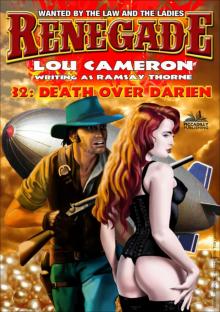 Renegade 32
Renegade 32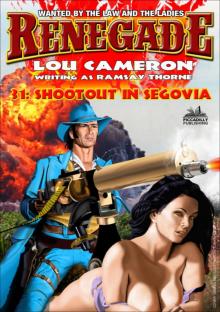 Renegade 31
Renegade 31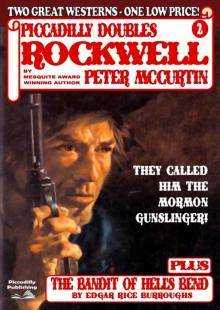 Piccadilly Doubles 2
Piccadilly Doubles 2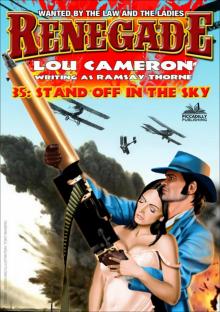 Renegade 35
Renegade 35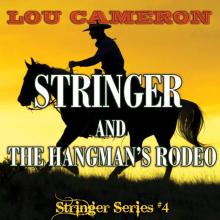 Stringer and the Hangman's Rodeo
Stringer and the Hangman's Rodeo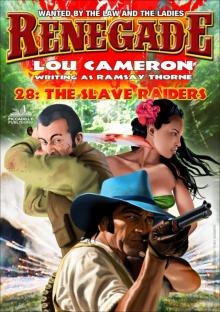 Renegade 28
Renegade 28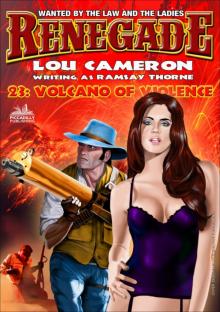 Renegade 23
Renegade 23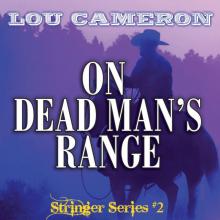 On Dead Man's Range
On Dead Man's Range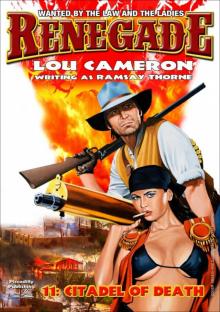 Citadel of Death (A Captain Gringo Western Book 11)
Citadel of Death (A Captain Gringo Western Book 11)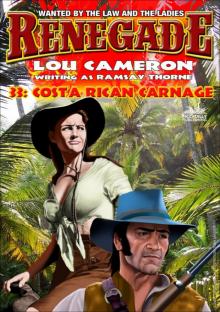 Renegade 33
Renegade 33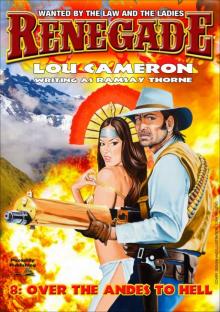 Over the Andes to Hell (A Captain Gringo Western Book 8)
Over the Andes to Hell (A Captain Gringo Western Book 8)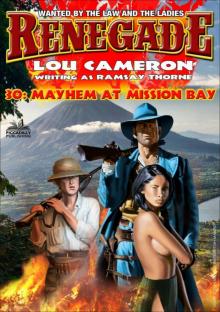 Renegade 30
Renegade 30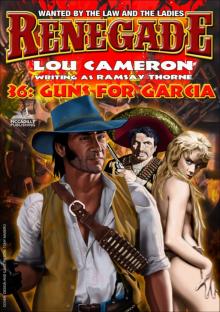 Renegade 36
Renegade 36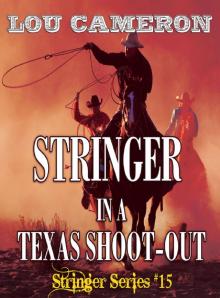 Stringer in a Texas Shoot-Out
Stringer in a Texas Shoot-Out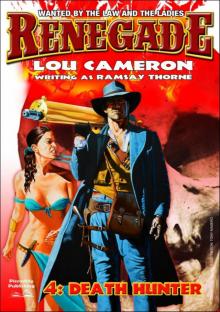 The Death Hunter
The Death Hunter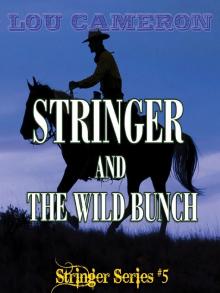 Stringer and the Wild Bunch
Stringer and the Wild Bunch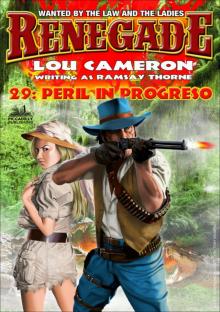 Renegade 29
Renegade 29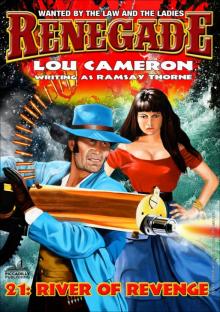 Renegade 21
Renegade 21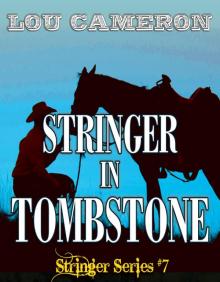 Stringer in Tombstone
Stringer in Tombstone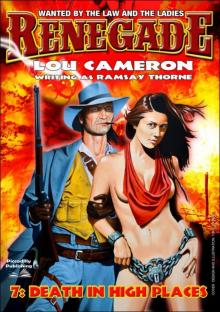 Death in High Places (A Renegade Western Book 7)
Death in High Places (A Renegade Western Book 7)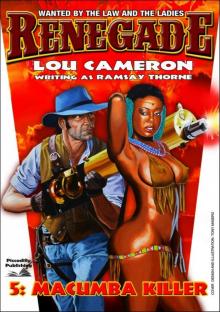 Macumba Killer
Macumba Killer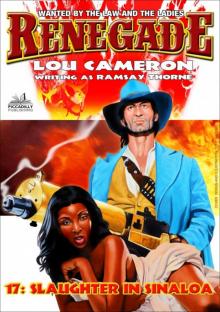 Renegade 17
Renegade 17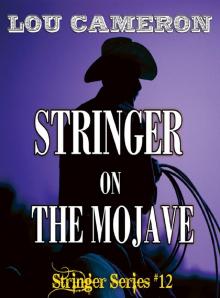 Stringer on the Mojave
Stringer on the Mojave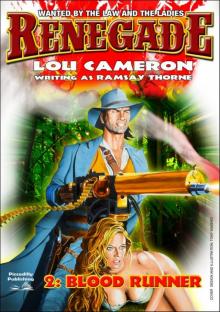 Blood Runner
Blood Runner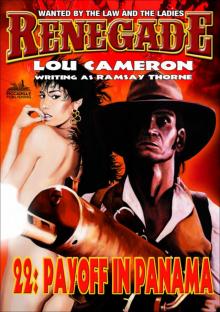 Renegade 22
Renegade 22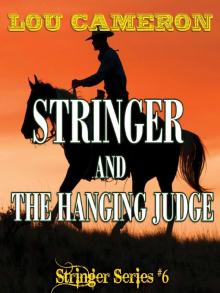 Stringer and the Hanging Judge
Stringer and the Hanging Judge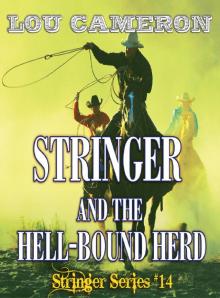 Stringer and the Hell-Bound Herd
Stringer and the Hell-Bound Herd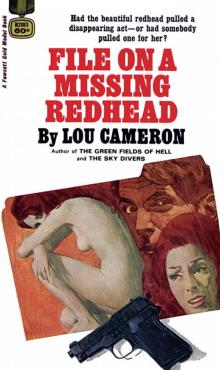 File on a Missing Redhead
File on a Missing Redhead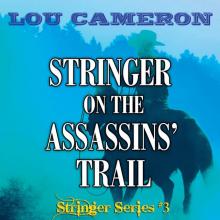 Stringer on the Assassins' Trail
Stringer on the Assassins' Trail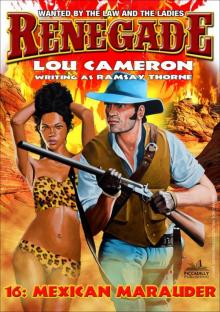 Mexican Marauder (A Captain Gringo Adventure #16)
Mexican Marauder (A Captain Gringo Adventure #16)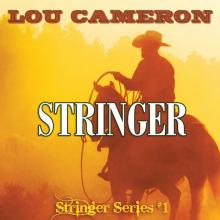 Stringer
Stringer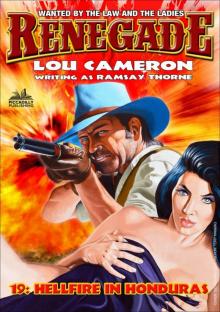 Renegade 19
Renegade 19 Stringer and the Oil Well Indians
Stringer and the Oil Well Indians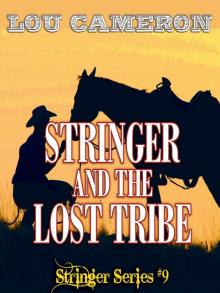 Stringer and the Lost Tribe
Stringer and the Lost Tribe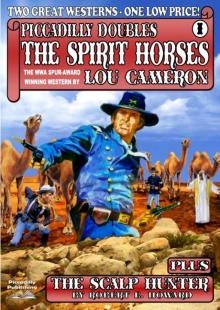 Piccadilly Doubles 1
Piccadilly Doubles 1 Stringer and the Border War
Stringer and the Border War Renegade
Renegade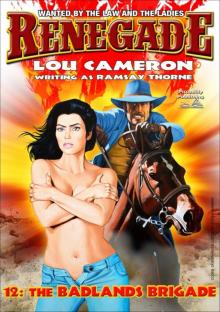 The Badlands Brigade (A Captain Gringo Adventure Book 12)
The Badlands Brigade (A Captain Gringo Adventure Book 12)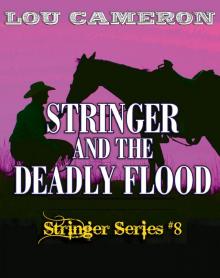 Stringer and the Deadly Flood
Stringer and the Deadly Flood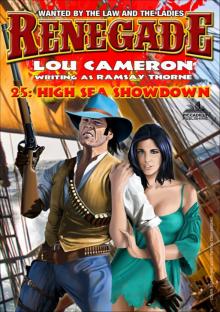 Renegade 25
Renegade 25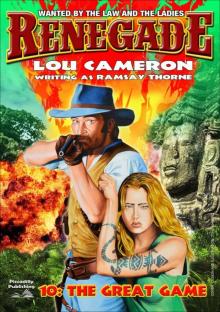 The Great Game (A Captain Gringo Western Book 10)
The Great Game (A Captain Gringo Western Book 10)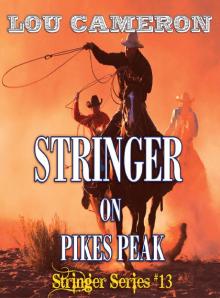 Stringer on Pikes Peak
Stringer on Pikes Peak